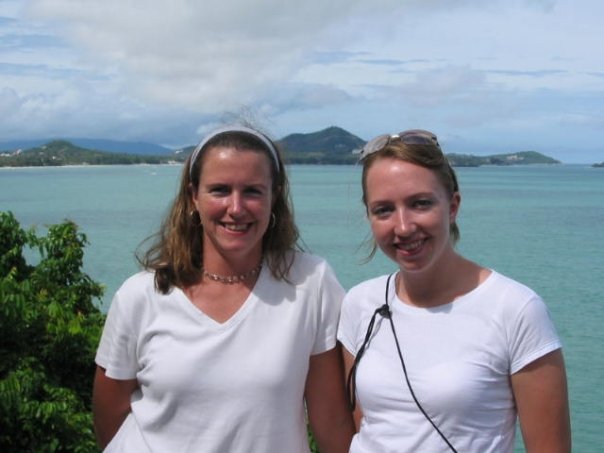My sister died 10 years ago at a self-improvement retreat.
It was run by a man who’d been on Oprah, who had a New York Times best seller, and was part of the self-help megahit, The Secret. Everyone thought he was legit. She definitely did. So when he told people to stay inside of a poorly constructed, poorly managed “sweat lodge,” even though it was far too hot, they stayed. My sister Kirby, along with two other people, died.
Ten years is a long time. In that time, I’ve learned a lot about grieving.
1. We can choose (sometimes) how we grieve.
I’ve come to realize that I have some agency in how I manage grieving…sometimes. Sometimes, it’s true, it comes in waves that pull me in different directions and I feel I have no control. But other times, I can steer through it. As that storm calmed after the initial shock of Kirby’s death, I gained even more control to choose how I was going to let the grief into my life. But I have to constantly check in with myself that I am okay to stay that course, that it’s safe for me.
I’ve chosen to keep the hard part of the grief closer than some people might. I follow the man responsible, because he’s still trying to be a motivational teacher, and I watch for other examples of abuse and harm from the self-help industry. It’s hard to do this, but I try to make it positive. I work with SEEK Safely, the organization my family started to guide other seekers of self-improvement into safer journeys than the one Kirby had. My mom and I also wrote a book about what happened to Kirby, and to us after she died. That was certainly a deep dive into the pain, but these actions are an important part of how I live with the loss.
2. The loss behind the grieving will always feel unfair.
However, revisiting it frequently has made me realize that I can still feel the exact same way today that I felt on the day I first learned that Kirby had died. Sometimes I feel angry when I see that the man responsible for Kirby’s death has an event he is charging $20,000 to attend. I get frustrated when I hear about a cult that masqueraded as a leadership development program. I get sad when I miss my sister, and angry when I think about everything that has happened in my life in the past 10 years for which she has been absent.
Learning to live with the pain of loss does not erase the injustice of that loss. When someone we love dies, it’s not fair, and that’s a valid feeling to revisit, too.
3. Grief means “deep sorrow” but grieving is not just about being sad.
Beyond the space inside that holds the anger, frustration, and sadness, a larger space has opened up, a cavern of so many other feelings and memories that are all part of the grieving. It’s the space where I remember our best times together, like when we played golf in the rain in Malaysia’s Cameron Highlands to honour our Scottish heritage. Where I enjoy my life in the present, even without Kirby. Where I clutch her memory like a talisman, inspiring and encouraging me to approach life with the gratitude and wonder Kirby lived all the time. I read a quote of unknown origin recently: “Be the things you loved most about the people who are gone,” and oh, how that resonates!
There’s also the space inside that’s inspired by the way she died. Kirby was trying to do something profound when she died. She wanted to be the best version of herself. She was driven, motivated, and she succeeded in so many ways even before she had ever read a quote from The Secret. There are many people like her, seeking this same sort of self-fulfillment. Kirby’s death could save those people’s lives. Understanding her death motivates me to try to reach them and share her story. Grieving is about making space for all of the feelings we hold when we think of the person we’ve lost.
4. Grieving takes constant practice.
In this way, grieving is not a process of getting over sadness. It’s a process of learning how to integrate this painful reality into my life, again and again. Every time I change, I have to revisit the sadness and rediscover how it fits. In the beginning, that dark corner took up most of the picture. Over time, though, the brighter elements have claimed a larger piece of the whole, creating something that is not all anger and sadness. And it’s that little bit of dark that makes everything else appear more vibrant and alive in contrast.
~
This, of course, is just my experience. I imagine grieving happens differently for other people. Our feelings are complex. We are complex and beautiful, and our experiences fracture us into millions of tiny pieces that shimmer like a kaleidoscope when we hold ourselves up to the light.
It’s not accurate, exactly, to say I am grateful for my grief. I think how I feel about it doesn’t have a word. But after 10 years of living with the loss of my sister, I can love even those dark little corners in my heart where the sadness lives.


 Share on bsky
Share on bsky





Read 0 comments and reply